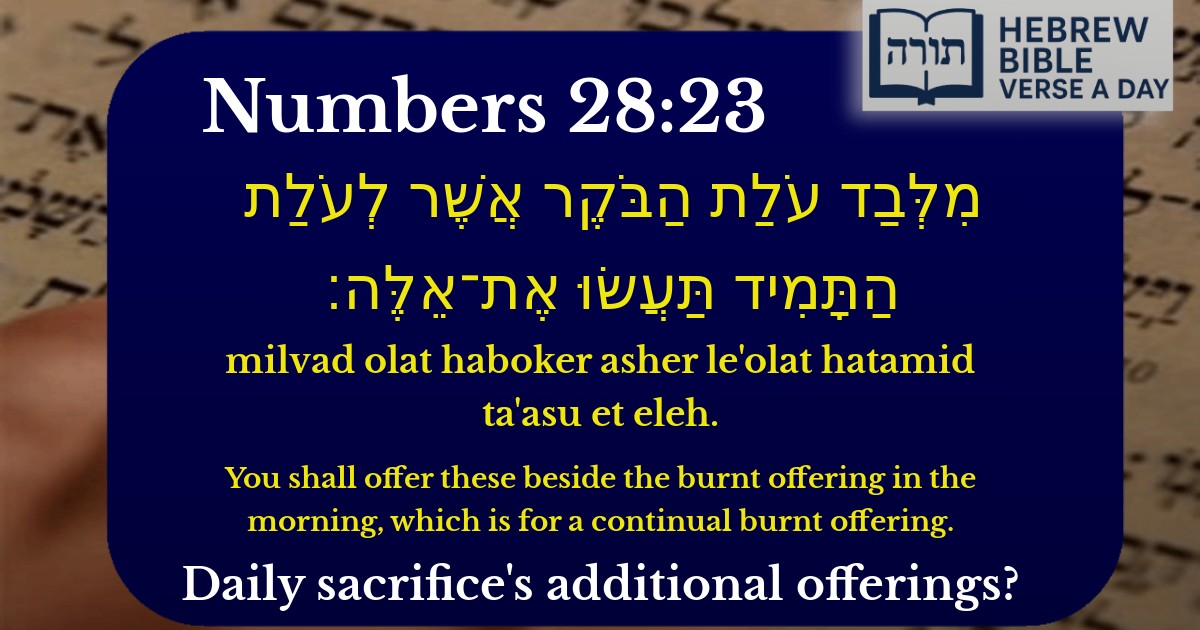Frequently Asked Questions
Q: What does Numbers 28:23 mean when it mentions the 'continual burnt offering'?
A: Numbers 28:23 refers to the 'Tamid' offering, a daily sacrifice brought in the Temple every morning and afternoon (Exodus 29:38-42). Rashi explains that this verse emphasizes that additional holiday offerings (mentioned earlier in the chapter) must not replace the Tamid, but be offered in addition to it.
Q: Why was the continual burnt offering so important in Jewish tradition?
A: The continual burnt offering (Tamid) was central to Temple service, representing the Jewish people's constant devotion to Hashem. The Rambam (Hilchot Temidin uMusafin 1:1-3) teaches that it atoned for sins and maintained a daily connection between the nation and G-d, even when no other sacrifices were brought.
Q: How does the concept of the continual burnt offering apply to Jewish practice today?
A: Although we cannot bring sacrifices without the Temple, our daily prayers correspond to the Tamid offerings (Berachot 26b). The morning Shacharit and afternoon Mincha prayers were established to parallel the morning and afternoon Tamid offerings, maintaining our constant spiritual connection.
Q: What can we learn from the instruction to bring additional offerings 'beside' the continual offering?
A: The Talmud (Menachot 49b) derives from this verse that special mitzvot (like holiday observances) must never replace our regular commitments to Hashem (like daily prayer). Both are essential - our constant devotion forms the foundation, while special occasions provide additional opportunities for connection.
Q: Why does the Torah specify that these offerings must be brought 'in the morning'?
A: Rashi (on Exodus 29:39) explains that the morning Tamid represents dedicating the first part of our day to Hashem. The Midrash (Tanchuma Tetzaveh 14) teaches this demonstrates we prioritize our relationship with G-d before engaging in worldly matters, setting the tone for the entire day.


Context in the Torah
The verse (Bamidbar 28:23) appears in the context of the additional offerings (קרבנות מוסף) brought on festivals, specifically discussing the Musaf offerings of Shavuot. It emphasizes that these additional offerings do not replace the daily Tamid offering but are brought in addition to it.
Rashi's Explanation
Rashi explains that the phrase "מִלְּבַד עֹלַת הַבֹּקֶר" teaches that the Musaf offerings must not be brought instead of the Tamid offering, but rather in addition to it. The Tamid offering maintains its fixed schedule, and the Musaf offerings are supplementary. This reinforces the principle that the daily service in the Beit HaMikdash remains unchanged even on special occasions.
Rambam's Perspective
In Hilchot Temidin uMusafin (1:3), the Rambam codifies this law, stating that the Tamid offering takes precedence over all other sacrifices. Even when additional offerings are brought for festivals, the Tamid is never omitted. This underscores the eternal nature of the covenant between Hashem and Klal Yisrael, symbolized by the constant daily offering.
Midrashic Insight
The Midrash Tanchuma (Pinchas 12) connects this verse to the concept of consistency in avodat Hashem. Just as the Tamid offering is brought daily without interruption, so too must our commitment to Torah and mitzvot remain constant, even when adding special observances for festivals or other occasions.
Halachic Implications